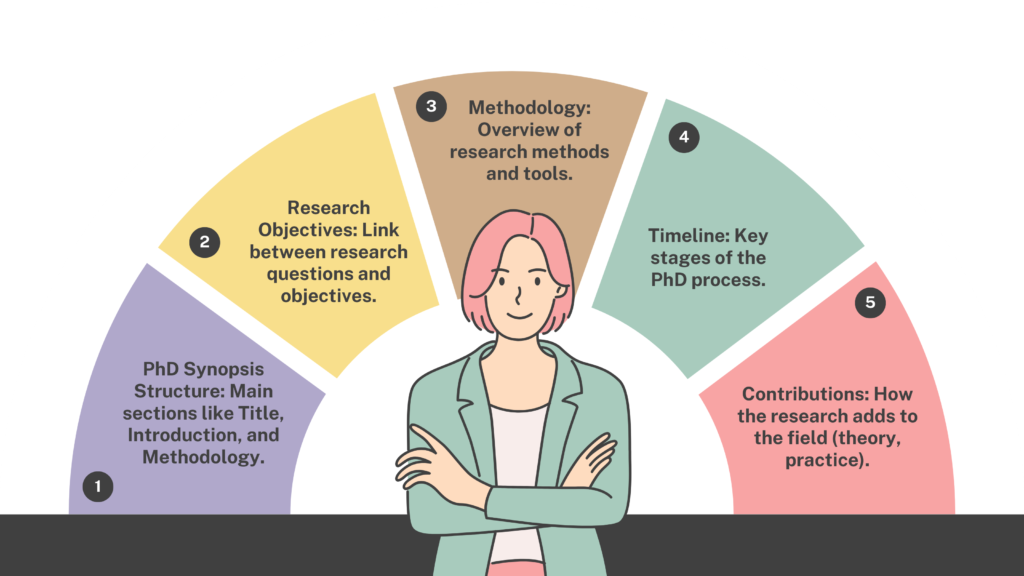Format Of Synopsis for PhD
How to Write a Synopsis for PhD:
Embarking on a PhD journey is a challenging but rewarding endeavour. One of the critical elements of this journey is writing your PhD synopsis. A well-crafted synopsis not only provides an overview of your research but also serves as a blueprint for your dissertation. It outlines the key questions, objectives, methods, and anticipated contributions of your research. In this guide, we will explore how to write a synopsis for a PhD in a clear and structured manner.
In addition to helping you meet university requirements, a concise and persuasive synopsis can enhance your ability to secure funding, attract collaborators, and gain support from your academic supervisors. Here’s a step-by-step breakdown of the essential elements to include when crafting a PhD synopsis.
Key Elements of a PhD Synopsis

What is a PhD Synopsis?
A PhD synopsis is a brief summary of your proposed research. Typically, it ranges from 1,500 to 3,000 words, depending on the institution’s guidelines. The Synopsis aims to deliver a clear and brief summary of your research topic, its relevance, the methods you intend to utilize, and the anticipated results. Essentially, it’s a roadmap of your PhD project, which helps assess whether the project is feasible and worth pursuing.
Importance of a Well-Written PhD Synopsis
Before we delve into the format of a PhD synopsis, let’s understand why it holds such significance in the academic journey:
Clarity of Research Goals: A synopsis helps clarify your research objectives and ensures that you are focused on a well-defined problem.
Structured Research Process: Crafting a synopsis necessitates organizing your research data in a systematic and coherent way. It pushes you to organize your thoughts and plan your research process methodically.
Approval from Supervisors: A well-crafted synopsis is essential for receiving approval from your academic supervisors, as well as for obtaining any necessary funding or ethical clearances.
Foundation for the Dissertation: The synopsis serves as the foundation upon which your dissertation will be built. The clearer the synopsis, the smoother the dissertation-writing process will be.
Essential Components of a PhD Synopsis
When crafting your PhD synopsis, it’s important to follow a structured format that typically includes the following sections:
Title of the Research
The title serves as the initial gateway through which your research connects with its intended audience. It should be concise, informative, and reflective of the core focus of your research. Avoid vague or overly technical jargon that might obscure the true nature of your study.
Introduction
The introduction of your PhD synopsis should provide a clear context and background for your research. In this section, you outline the significance of your research and its relevance to the wider field of study. It should answer the following questions:
What is the problem or issue your research seeks to address?
Why is this problem significant?
What is the current state of research on this topic?
The introduction should end with a statement of your research problem or research question, which will be explored in depth in the following sections.
Review of Literature
A comprehensive literature review is a crucial element of the PhD synopsis, showcasing your knowledge of the current research landscape in your area of study. The purpose of this section is to identify gaps in current knowledge that your research will address. You should:
Highlight key studies and their contributions to the field.
Discuss how your research will build on, diverge from, or complement these studies.
Demonstrate the originality of your proposed research.
Make sure your literature review is comprehensive but not overly detailed. It should convey the theoretical framework upon which your research is based.
Research Objectives and Questions
This section outlines the key objectives of your research and the specific questions you aim to answer. These objectives should be:
Clear: Use precise and unambiguous language.
Focused: Avoid being overly broad; each objective should directly relate to your main research question.
Measurable: It should be possible to evaluate the success of your research against these objectives.
For example, if your research is about climate change mitigation strategies, an objective might be to assess the effectiveness of policy interventions in reducing carbon emissions.
Research Hypotheses
If your research involves testing hypotheses, this section should state them clearly. A hypothesis is a provisional solution to your research query, which you will either validate or disprove through the findings of your investigation. A good hypothesis should be:
Specific: It must be clear what exactly you are testing.
Testable: It should be possible to test the hypothesis through data collection and analysis.
Research Methodology
The methodology section is one of the most critical aspects of your synopsis. It describes the approach you will take to answer your research questions and achieve your objectives. This section should detail:
The research design (e.g., experimental, observational, descriptive).
The data collection methods (e.g., surveys, interviews, archival research).
The sampling techniques (e.g., random sampling, stratified sampling).
The tools and instruments you will use for data analysis (e.g., statistical software, qualitative coding techniques).
A well-thought-out methodology not only strengthens your research design but also makes it easier for your supervisors to assess the feasibility of your research.
Expected Contributions and Significance
Every PhD thesis is expected to contribute something new to the field. In this section, discuss the potential contributions of your research and how it will impact your area of study. Your contributions could be:
Theoretical: Developing new models or frameworks.
Practical: Providing solutions to real-world problems.
Methodological: Introducing new research techniques or tools.
Make sure to explain why these contributions are significant and how they fill existing gaps in the literature.
Research Timeline
A PhD is a long-term commitment, and having a clear timeline can help you stay on track. In this section, present a realistic research timeline, broken down into phases such as:
Literature review
Data collection
Data analysis
Writing the dissertation
Be mindful to build some flexibility into your timeline to accommodate unexpected delays, but it’s important to show that you’ve thought about how to complete your research within the allotted time frame.
Limitations of the Study
No research is without limitations. This section should address the potential limitations of your research—whether they are related to data availability, methodological constraints, or other factors. Acknowledging these limitations demonstrates intellectual honesty and allows your supervisors to provide helpful guidance on how to mitigate them.
References
Finally, your synopsis should include a list of the key references that have informed your research. Use a consistent referencing style, such as APA, MLA, or Chicago, as per your university’s guidelines. This section showcases the depth of your engagement with the existing literature and ensures that you’ve acknowledged all relevant sources.
Crafting a PhD synopsis is a vital milestone in your academic path. It provides a structured and detailed plan of your research, enabling both you and your supervisors to assess the feasibility and significance of the project. A well-crafted synopsis not only sets the stage for your PhD dissertation but also lays the foundation for successful research.
In summary, a well-written PhD synopsis should include a concise title, a comprehensive introduction, a thorough literature review, clear research objectives, and a detailed methodology. It should also highlight your research’s expected contributions, present a realistic timeline, and acknowledge the study’s limitations. By following this format, you will not only meet institutional requirements but also create a valuable roadmap that will guide you through the rest of your PhD journey.
Reach out to us at www.saairatechnologies.com or give us a call at 7604897174 if you need assistance with the Synopsis Writing Service.
Our strengths
Guarantee of Service
PhD in Creativity
At Saaira Technologies, our mission is to provide a level of service unparalleled by any other organization. We take immense pride in our team of highly skilled and experienced pro-writers. We are excited to declare that, at Saaira Technologies, we never compromise when it comes to quality. Our commitment to excellence sets us apart in the industry.
Assurance and Privacy
At Saaira Technologies, we guarantee that your research and personal information will be treated with utmost confidentiality. We are committed to maintaining strict privacy and ensuring that your data is securely handled for internal purposes only. Your trust is of paramount importance to us, and we take every measure to safeguard your information.
24/7 Service Assistant
At Saaira Technologies, our team of experts is readily available round the clock on Facebook, WhatsApp, and Email, ensuring uninterrupted support and assistance. We operate 24 hours a day, 7 days a week, allowing clients to conveniently connect with us at any time. Your satisfaction is our priority, and we are committed to providing timely and reliable service.
Why choose us?
PhD help technical experts are very friendly and always ready to hear from you. Our experts are available at any stage of your PhD work.
The project you submit to us will be a hidden treasure and it will be confidential and maintained very secretly.
PhD help projects are always cost effective but we assure you that this will not affect the quality of your work.
PhD help developers are well experienced and professionals in their particular field. They are very eager and always on duty. They are readily available to help you in any situation and time. Our experts are available on the shop floor always ready to help you at any point of your PhD you are stuck.
Teams of Saaira Technologies
Business Development Executives


Data Scientist
Language Editing Division


Department of Journal Publications
What Sets Us Apart from The Competition?

